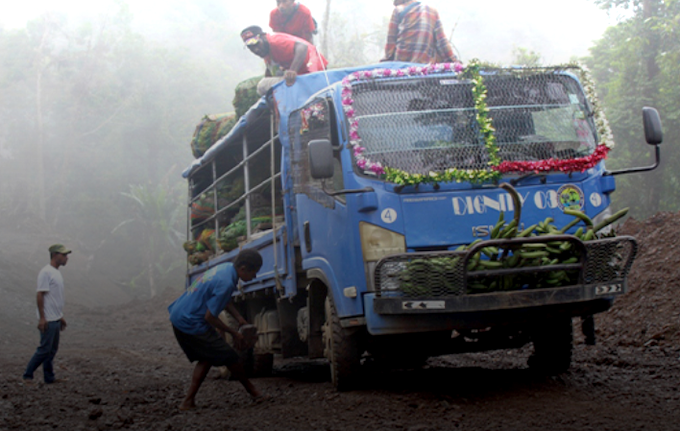By Hezron Kising in Lae
It takes up to 6 km for women from Milampipi and Kaisia villages in the mountainous hinterlands of Papua New Guinea’s Nabak local government in Nawaeb district, Morobe province, to reach the nearest roads by foot.
For more than 40 years they have had to do this before they could catch a vehicle to sell their garden produce in the markets in Lae city 21km away.
For the women — especially mothers — the struggle is real. They have walked for six to seven hours, climbing steep rugged mountains, crossing dangerous fast flowing rivers with heavy loads of vegetables, bananas, taro and sweet potatoes to reach Situm or Hobu to get on a PMV (public motor vehicle).
November 7, 2021, is a day the villagers will never forget –– on that day, the first PMV truck nicknamed “Dignity” drove into the village for the first time to bring the mothers and their produce to markets.
That was made possible after the national government, through the Department of National Planning and Monitoring, with Nawaeb and Finschhafen districts allocating funds, initiated the construction of the Nawaeb-Finschhafen Highway this year.
The road will link rural villages in the two districts to the provincial capital, also enabling some of the best organic coffee to reach market.
One mother, Wangeng Akundi, was emotional and shedding tears of joy when she put her bilums (string bags) packed with garden foods and sako (vegetable) on the truck for the first time.
Walking for years with heavy loads
She says that for years, they had walked long distances with their heavy loads.
“Sometimes we also carry our babies on top of the loads to seek medical services in Situm or Lae,” she adds.
“We are thankful to Anutu (God) for the road access that has reached us and now we will just get on a PMV and travel to Lae for our marketing.”
John Kamsi, a person living with a disability, says it takes him longer to reach the main roads to seek medical services.
“I am very happy with the new road,” he said.
A mother of one, Sandra Yaling, says: “We’re very happy with the new road, because some of us put our lives and the lives of our children at risk many times just to get to the nearest road.
“The main things that we need are cooking oil, soap and salt.”
Real struggles for food
PMV owner Eric Piving, whose vehicle was the first to bring the women and children with their produce to Bumayong and Igam markets, says many times he felt sorry for the mothers.
They had to walk long distances with their foodstuffs to sell and meet their basic household needs.
“We’ve dreamed for a road into the villages and now it has happened,” he says.
He said many times people see them selling their produce at the markets, without knowing the real struggles they have to go through to bring those food items to the market.
“Since first the Lutheran missionaries came to Finschhafen and took the same route towards Nawaeb, then to parts of Morobe — the new highway should be named Miti Highway’, which means ‘God’s Word highway’),” Piving says.
“We thank the government and our local MPs for their support.”
Nawaeb MP Kennedy Wenge told the PNG Post-Courier that the District Development Authority allocated K100,000 (NZ$43,000) each year to support the new stretch of road from Hobu to Momolili.
K280 million allocated for road
“The Department of National Planning and Monitoring allocated K280 million (NZ$120 million) in 2020 and has continued funding the road that will connect Lae-Nawaeb and Finschhafen,” he says.
“I want our people to appreciate what the districts and the national government have committed and support the work. The Nawaeb to Kabwum road will also take shape once K100 million (NZ$43 million) funding is made available.”
Wenge says the villages also produce high tonnes of coffee and the road will assist them greatly in terms of accessing markets.
More than 2000 people from villages in Nawaeb will benefit from the road. Apart from road Wenge, says he is also ensuring maintenance on rural airstrips so people can transport their coffee and garden produce to the markets in Lae.
That is to support villagers gaining some income.
Republished with permission from the PNG Post-Courier.

This post was originally published on Asia Pacific Report.
 (@mer_edie)
(@mer_edie)